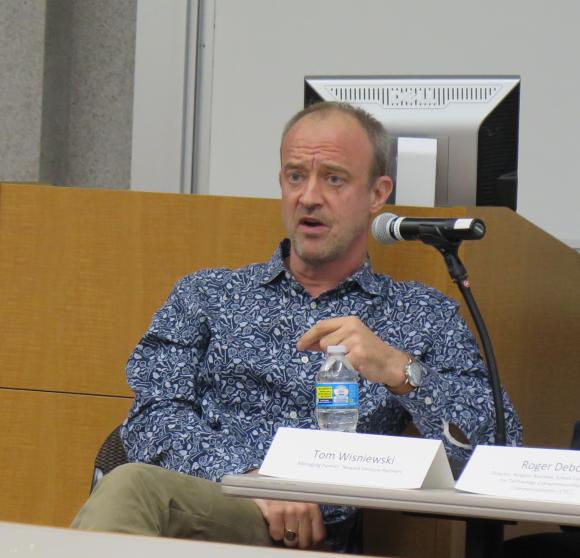
Tom Wisniewski, of Newark Venture Partners, was one of the panelists who talked about the legal needs of technology start-ups.
While New Jersey is a fertile place for incubators, technology start-ups, and entrepreneurship, lawyers must become more innovative to meet the legal needs of such businesses.
That was the message Rutgers Law students heard at a panel called “Entrepreneurship, Technology, and the Law: Emerging Issues in New Jersey’s Start-Up Economy.” The panel, which featured experts from Rutgers Business School, business organizations and law firms, was sponsored by the Rutgers Computer & Technology Law Journal and the Rutgers Center for Corporate Law and Governance. Professor Douglas S. Eakeley was the moderator.
“Think creatively about innovative legal services,” advised Raymond P. Thek, the Tech Group Co-Chair for Lowenstein Sandler LLP. “Tear down how legal services are traditionally given out.”
There are many opportunities for start-ups in New Jersey, including in the City of Newark, explained Tom Wisniewski, managing partner of Newark Venture Partners, a venture fund and accelerator in downtown Newark that has corporate investor partners, including Audible Inc. and Prudential. “We invest in seed stage companies,” he said. “We want to move the needle on bringing jobs here.”
Roger Debo, a Rutgers professor who leads a graduate course at the Business School where students create start-up business proposals, said the first interaction many entrepreneurs have with attorneys is to learn about business regulations and restrictions. Debo, who modeled his class after a program he developed at North Carolina State University, said he coaches students into coming up with viable business plans, asking them whether there are customers for what they’re selling, and giving them actual business experience and exposure to investors.
Also focusing on giving students hands-on experience was panelist Mukesh Patel, who teaches a course on entrepreneurship at Rutgers Business School. A serial entrepreneur, Patel is the founder of JuiceTank, a co-working space for tech startups in Somerset County and is an adjunct professor in the law school’s new Entrepreneurship Clinic.
Through JuiceTank, he said innovators can seek co-founders, get mentorship, use a 3D studio, and seek capital investors. “There are lots of actual things they can use to launch their companies,” he said. Patel said some fledgling companies use the space for a year, others have stayed up to three years, as they get established. Using that model, he also teaches business students to explore innovative business ideas and puts them into teams to try and launch a business.
Mukesh Patel is the founder and CEO of JuiceTank and an adjunct professor at Rutgers Law School.
Thek said entrepreneurs are innovative and want lawyers who are willing to think creatively. “You want to be a trusted advisor,” said Wisniewski. Debo added, “Be ready to listen, to adapt to the situation, you’ll build a tremendous amount of trust.”
Patel advised attorneys should get to know their entrepreneurial client before working with them, “Live with them for a week.” He said the attorney will have a better understanding of the client’s way of thinking, comfort with risk-taking, and creative ideas. “They want to do business,” said Patel. “That’s what drives them.”
Professor Sabrina Safrin, another panelist, urged state government to do more to promote innovation, capital formation, and job creation.
